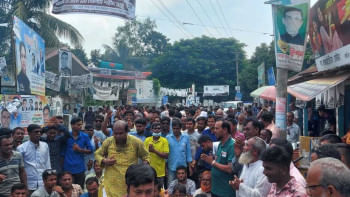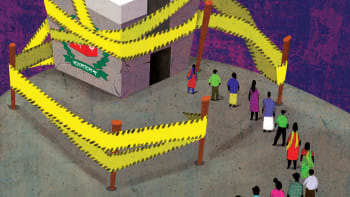'Fair' statements cannot change the reality of Gaibandha by-poll

In perhaps the first known instance of what could potentially be a new trend in Bangladesh elections, a number of presiding officers of the suspended Gaibandha-5 by-poll have alleged that they were forced to give out statements saying it was "free and fair", in some cases with the figures of total votes cast mentioned. According to several newspapers, this happened after the Election Commission declared the election suspended, following widespread irregularities and a mass boycott by all but one of the candidates. Although such statements have no legal basis, those could be used to discredit the EC's decision or force it to adopt a lenient approach in subsequent actions.
What worries us particularly is the coordinated manner in which the statements – over 50, allegedly – were collected, or the polling booths were infiltrated by outsiders, called "robbers" by the CEC.
This is but the latest proof that serious irregularities did occur in this election – something denied, against evidence, by the local and central Awami League leaderships, and even the local superintendent of police, who should have known better. Justifying its decision on Wednesday, the EC described the irregularities it observed, including illegal presence of men in polling booths, vote rigging, removal of CCTV cameras, etc. In many cases, polling agencies of opposition candidates were forced out of the centres. Now, at least four out of the 16 presiding officers contacted by this newspaper have claimed that they were forced by Awami League men and polling agents to write statements on white papers.
Some of them described seeing illegal infiltration of men in secret polling booths. Others described how, after the suspension decision was announced, they were barred from leaving polling centres until they declared the results. They were totally unprotected. In one instance, a UNO asked a presiding officer to write the statement. Clearly, the danger was from both within and outside. What worries us particularly is the coordinated manner in which the statements – over 50, allegedly – were collected, or the polling booths were infiltrated by outsiders, called "robbers" by the CEC. Clearly, someone was pulling the strings behind such well-orchestrated moves. Someone was bringing people from outside the constituency to make identification and possible legal action difficult.
The statement collection starts to make sense when we consider that Awami League activists organised protests soon after, demanding declaration of results from centres where voting was not halted before suspension. This – and the potential complicity of the Awami League candidate and field-level administrators responsible for law enforcement – must be taken into consideration now that the EC is investigating irregularities. If presiding officers can be threatened or forced to act unlawfully, in their own centres no less, one shudders to think what else unscrupulous political elements can do using their influence.
Presiding officers in Gaibandha have created a unique challenge for the EC. They seem to have been both enablers and victims of coercive tactics. At a press conference on Thursday, the EC held them as well as the local administration responsible for the widespread irregularities. It now must ensure proper investigations to get to the bottom of the matter, and punish those responsible.

 For all latest news, follow The Daily Star's Google News channel.
For all latest news, follow The Daily Star's Google News channel. 







Comments